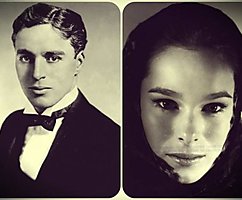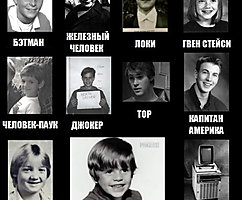Top 10 games of mathematics with our mind and conscience
 Bashny.Net
Bashny.Net
Mathematicians always strive to describe our life as a formula. Sometimes it turns out very convincing. But this is only as long as the game does not come purely human variables — conscience, confidence, thirst for justice, selfishness, altruism. The math stops working, and starts at least psychology. We have selected ten of the most striking intellectual games, in which life in all diversity of its manifestations.
1. "Prisoner's dilemma": to knock or not to speak?

Rules
Imagine that You tried to Rob a Bank. But, alas, You and Your accomplice was caught and put into different cells. The investigator proposes a deal: You give evidence against your partner and then get a chance for liberation for the help to a consequence. You have four options.
1. You agree and testify. Your companion is silent. Then he gets ten years and you go free.
2. You inject, and your partner talking. Then you both get two years.
3. You proudly say nothing, but your co-defendant is testifying. Then to freedom he goes out, and you get ten years.
4. You're both silent, and in six months you released for lack of evidence.
And what do you choose? The interrogator opens the door of your camera...
History and usage
The basic model of the "prisoner's Dilemma" proposed in 1950 by the American mathematicians Merrill flood and Melvin Dresher working at RAND research Corporation. This game is needed to predict the nuclear arms race — the role of prisoners were made by the USSR and the USA.
Since then, the game became very popular among mathematicians, philosophers and psychologists. Leaving the military criminal cover, you can also find many other examples. The same arms race is now very similar to the advertising campaign. Constant competition in the amount of advertising content steadily increases the costs of firms. Accordingly, from the termination of the race would benefit all parties. But if someone treacherously violated the truce, he will win the war for the consumer, and the rest will lose.
In the US, even the competitions between teams of universities for the best programmed game strategy in a "prisoner's Dilemma", where victory is awarded for a minimum period of imprisonment on the basis of several rounds of interrogation. Won program based on the principle of "an eye for an eye": she came every your partner exactly as it do a course previously. But it's still math, human life is much more complicated.
Human qualities
In reality, you are unlikely to Rob banks. But Russian investigators will not offer such deals. It is a model, parable, metaphor of human relations.
That the total punishment was the least profitable to both silent. Then the total period of his release will be only a year or a lot less than any other scenario. But how much do you trust someone that was going to work? And he to you? And what do you mean his interests? To what extent are you willing to risk?
The main problem of the "prisoner's Dilemma" is trust. It is because of the reluctance to trust another and there is a conflict of interests, which was erected in the absolute, for example, the writers of the horror series "Saw". Thus, in the fifth part of the heroes can get rid of literally a little blood to escape from the trap. But instead they begin to compete, which leads to the death of most of them.
2. "Ultimatum": how much would You pay for justice?
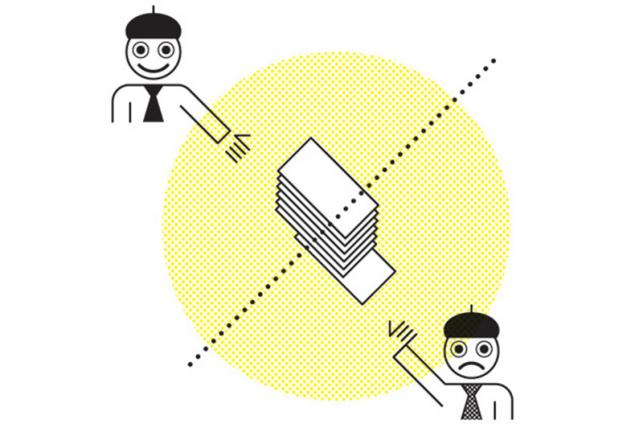
Rules the Two players are to divide a certain amount of money, say 1000. The first of them, the pitcher, offers its own version of the division, for example, each of 500 rubles, or the 800, and mate — 200, etc. the Second player, the host, can either accept the proposed terms and to obtain their share, or to reject the scheme of the section. In the second case, nobody gets paid — they go back to the Bank.
History and usage
The rules of this game were first formulated in 1982 in the Journal of Economic Behaviour and Organization to describe the process of negotiations. Simple in modeling and paradoxical results, it quickly became a favorite object of study for scientists around the world. The game "Ultimatum" fits many situations. For example, when the question, what part of the profit be spent on staff salaries, and which give the owners of the company.
Human qualities
What would you do in place of the host? Assuming rationality, it is necessary to agree to any version of section of money. Even if a pitcher wants to pick up a 990 rubles, still not worth arguing: 10 rubles still more than zero. But in addition to rationality, there is also justice.
In hundreds of experiments, the feed often offer their teammates from 50 to 30%. Somewhere in the interval from 30 to 20% of cases begin to withdraw from the transaction, choosing the principle of "do not get you to anybody!".
The understanding of justice depends on the culture. Peruvian Indians, for example, were inclined to accept almost any suggestions, and Asians were much sensitivity and are bitchier Americans. In one experiment, conducted in Indonesia, the subjects refused amounts, the components of several of their monthly salaries.
Actually, many psychologists did whatever the theme of the game "Ultimatum." It turned out that the results of the experiment are influenced by many factors: sexual arousal, age, degree of aggressiveness, testosterone level and so on.
In 2003 the journal Science published an article about the study in which the brain of the players in "Ultimatum" continuously monitored using MRI. It turned out that the host, after receiving the proposal aktiviziruyutsya islet, the proportion of the brain, the upper region of the frontal cortex and cingulate gyrus. The first of these areas is considered to be responsible for processing and formation of negative emotional information, and the other two — cognitive processes of self-control and choice. The outcome of this confrontation ancient mechanism of acquired emotions and rational thinking determines the final decision.
The experiments produced unexpected results. Subjects artificially blocked the rational frontal cortex. It would seem that the released emotions have mad to reject unfair offers. But the opposite happened: the players have become a lot more pliable and supple, emotions anger and resentment yielded to the innate sense of greed. It turns out that the most rational activity of the frontal cortex and leads to a deviation from reasonable mathematical strategies and ideas of honor and justice are forcing people to take a balanced-unfavorable decision. No wonder the experiments conducted on groups of autistic children, the percentage of failures was much lower. Devoid of social prejudices, they are much more likely to follow a perfect mathematical model.
The interaction of cognitive and emotional mechanisms of decision making and determines rational behavior of the person and a violation of any of them leads to a suboptimal choice strategies. These two systems can conflict, resulting in many examples of utilitarian thinking led to disastrous consequences and directly contradict the norms of morality, explains Anna Shestakova, senior researcher, Centre for neurocognitive research and education.
3. "The tragedy of the community field": if all will do so

Rules
The villagers speak a common pasture. If everyone will graze on it a cow, it's okay, herb will suffice. If someone wants to start a second, it seems to be also OK: the field is big. But if everyone will graze two cows, the grass on the field is not enough, the pasture is depleted, hunger starts.
History and usage
This model was proposed by William Forster Lloyd in 1833 in the book about the overpopulation.
— This tragedy of the Commons often occurs in life — played out a classic scenario from game theory. Examples of the environmental problems, traffic jams — any place where a person thinks that for free, you can quietly profit at the expense of the company, explains NES Professor Alexey Savvateev.
Behind examples far to walk not necessary. In Moscow, where traffic jams have become a huge problem, but the environmental situation is deteriorating from year to year, the residents stubbornly ignore the social campaign "car free Day", held since 2008. Moreover, according to some, this day the amount of congestion is particularly high.
Article different versions of this game appear in leading scientific magazines such as Science in our time. For example, there is a version of the experiment called "the Public good". Here is how it is described by scientists from the Higher school of Economics Dilyara Valeeva and Maria Yudkevich: "Each participant is initially endowed with a certain amount of money. Everyone should privately decide what proportion of these personal money he can invest in the public good. Invested in the public good money increase several times and divided equally. The group will receive the maximum benefit, if every participant invests his entire initial amount of money. However, players may shy away from investing their money in social enterprises. In equilibrium, predicted by the theory, each participant makes a zero contribution. In real experiments the outcome is usually different: the players bet a certain amount to the public good".
Human qualities
We do not consider it a sin to cause a little damage to nature or society. "From one of the abandoned paper the world won't collapse" — so says a passerby, and the city overgrown with garbage.
Sociologists and psychologists have long been trying to figure out how to get people to be more altruistic. One of the methods involve in the process, giving him a sense of pride in brought the benefit or harm-reduction. For example, at the Summer school of "Russian reporter" the students are encouraged to make a contribution in the amount of from 150 to 600 rubles per day — depending on financial possibilities. If some of the participants will make a minimum contribution, nothing bad will happen. But if everyone does that, then Summer school would be doomed to food shortages, and other problems. It seems that saves us a sense of belonging: "It's my project, I'm for it too answer." At least the last few years the average payment was two times more than the minimum.
The same series of music distribution via the Internet. Some groups offer to download their works for free, and then, after listening, to pay any amount. If you do not pay no one, the band won't record a new album.
Some economists believe that for such schemes the future, at least in the area of distribution of music, books and movies. For example, Professor of Higher school of Economics Alexander Dolgin introduces the concept of "after action reviews of gratitude payments". In his scheme the economy of the future will be able to defeat the riders due to the publicity of the assessment. If I read the book or watched the film, I have to put my personal assessment — to what extent I liked it. And it would be illogical if I put the highest score and not the author will donate a significant amount.
4. "The trolley problem": how can a humanity to kill a person
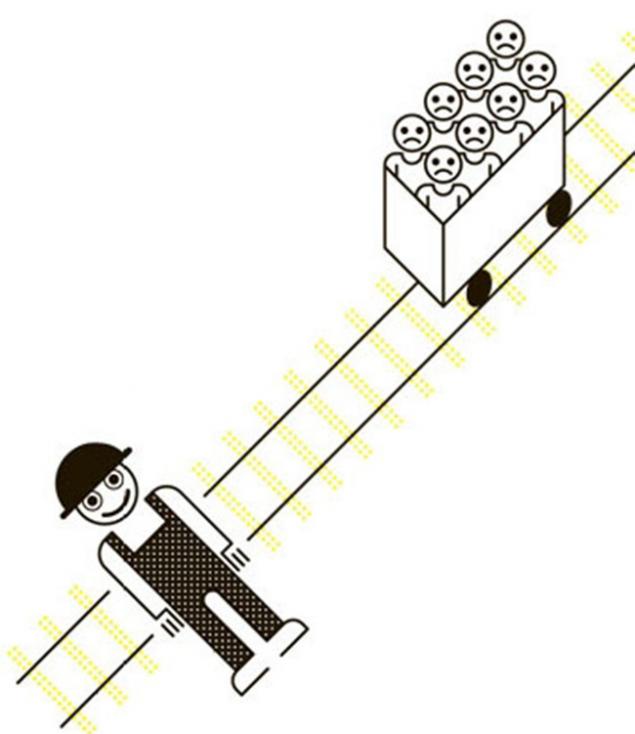
Rules
On the railroad here it will crash. Trolley filled with passengers, heading for the abyss. You have the opportunity to save her. For this we need your hands to push on the rails a fat road worker who happened to be nearby. People are going to die. But dozens of lives will be saved. Are you ready?
History and usage
The original wording of this painful dilemma was proposed in 1967 by British philosopher Philippa Foot as a thought experiment in ethics. Over the years there were many modifications. You kill one and save three. You kill the baby and save the life of ten. There is even a poignant short film, in which the switchman must choose: to crush his own son designs the bridge or to prevent a train crash with hundreds of passengers.
The most common application of this dilemma, of course, military action. Leaving a platoon to cover the retreat of the regiment, the commander sends on the death of thirty people, but gives a chance to thousands. But this situation can happen on a real railroad. Or during a fire. Or somewhere else.
Not sure we should be talking about life and death. Imagine that you are a Department head that needs to lay off one employee to save the whole team. Or are you taking a lesson in school, and you have to yell at one child to the rest of the class could have.
Human qualities
In this game, very little mathematics: ten is more than one, even a first grader knows. But the psychology of ethics in this dilemma in bulk. The commandment "thou shalt Not kill" is in conflict with the value of preserving life. By the way, in a short film about the switchman, the main character still sacrifices her son and train with unsuspecting passengers calmly went on.
In the experiment, conducted by psychologists at the University of Michigan, subjects were offered a realistic three-dimensional model with trolley, paths and need to kill one to save five. About 90% of the participants translated the arrow and killed a man for the passengers of the trolley. But it's still a computer reality, not real life.
5. "Hawks and doves": to attack or to flee
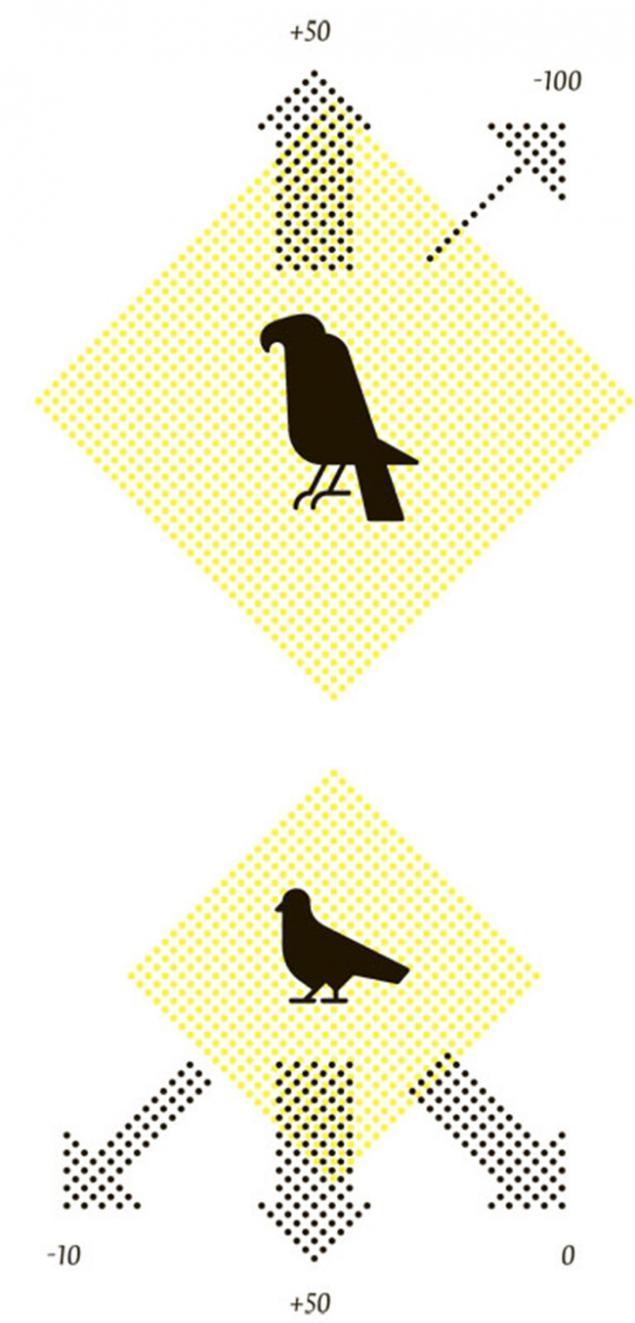
Rules
In one population of animals coexist two groups with different strategies for resources. First, the "hawks" are always set to a conflict and the meeting with the competitor go all the way. As a result, they either win and assign all resources in the area (+50 points), or lose and get into the fight seriously injured (-100 points). Doves, by contrast, is very peaceful. Seeing the "hawk", they immediately back down (0 points for "dove" and 50 points "hawk"), and when they met with their relatives only represent a willingness to fight. After a long exchange of threats (-10 points both "doves") resources get more lucky "the dove" (+50 points).
There are many other variations of the rules, but the main features of the game remain unchanged: victory brings any bird average points, receiving injuries from the "hawks" is equivalent to a huge fine, and ritual of battle "doves" also require some minimal costs.
The goal is very simple: to earn maximum points, that would be for them, no hiding food, money, females, or "the representation of an individual's genes in the gene pool of a population", as expressed by Richard Dawkins in his book "the Selfish gene".
History and usage
Rules of the game were first published in the journal Nature in 1973. The authors proposed to formalize the conflict animal for resources, territory, or sexual partners. The model allows the ratio of strategies in the population to calculate the number of resources required and received by individuals in a particular embodiment, interactions. The bird metaphor borrowed from the geopolitical slang of the time ("hawks" — for a tough confrontation with the enemy, "doves" — for discharge and compromises).
"Hawks and doves" appeared as the development of the game in which two drivers head toward each other. The loser is the player who first gets scared of a frontal collision and swerve to the side.
Human qualities
We tried to move away from classical game theory in which the set of possible strategies is small and is hard-coded, — says Mikhail Burtsev, head of the laboratory of neurointelligence and neuromorphic systems of the Kurchatov Institute. In 2007 he, along with his Manager Peter Turchin published in Nature an article in which he described how the strategy of "hawks" and "doves" occur naturally in the evolution of computer models.
— We have created a virtual world inhabited by agents who commit primitive acts that could be combined in more complex strategies. The behavior of a single agent was controlled by its own neural network. This allowed us to open up strategies that standard game theory never came to investigate, explains Michael.
So in the process of evolution this computer world it appeared their peace-loving "doves," "hawks", attacking all outsiders, and even "Grange", gathering in flocks in the face of danger. But the most interesting — that these mathematical agents began to appear sublime human feelings: concern about family, sacrifice and altruism.
6. "Pascal's wager": God and the benefit
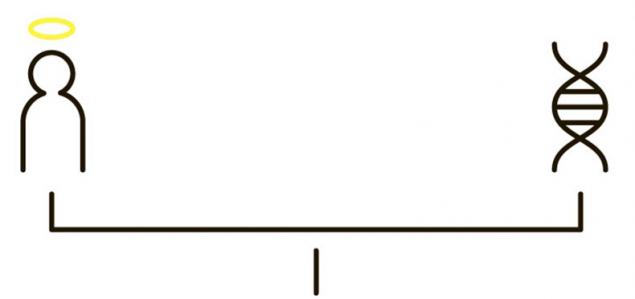
Rules
Each of us in his relationship with God is free to choose between faith and unbelief. In the first case, it carries negligible costs of complying with rituals and obedience to religious dogmas. But these ultimate losses will be compensated by endless profit and eternal life if God exists. The atheist, by contrast, suffers an infinite loss in the case of the existence of God, but in everyday life sacred is not burdened costs.
History and usage
On the night of 23 on 24 Nov 1654 in a brilliant French mathematician and philosopher, one of the founders of modern mathematical analysis and probability theory Blaise Pascal condescends inspiration. Recovering himself, he hastily writes down thoughts on a piece of parchment, which the rest of your life will wear in the lining of his clothes. Now Pascal is increasingly moving away from science and ignores the previous games — puzzles about the probabilities in gambling and the construction of the machine account. All the rest of his life is never over work "Thoughts on religion and other subjects", the pages of which he offers the reader such a sacred bet.
In one of the modern medical articles draws a parallel between the "Pascal's wager" and the position of the doctor when Tselovalnik the patient. The doctor must make a choice: to inform relatives about the possible imminent death of the patient or to give them hope, saying that maybe it would all cost. To talk about the possibility of recovery psychologically less costly. But if the patient dies, for relatives it would be a blow, and the doctor's reputation will suffer. To admit that the patient is likely to die, more complicated. But if the patient would recover, the doctor threatens the glory of the cynical genius. The authors recommend that physicians adhere to the difficult role of the pessimist. How do I know, maybe that's mindful of the "Pascal's wager", Dr. house did not like talking with relatives of their patients.
Human qualities
"Pascal's wager" emphasizes the paradoxical human desire to explain the irrational belief from the standpoint of reason and mathematical benefits. Dozens of thinkers later pointed to the weakness of this argument. Bet contrary to religious canons. Because faith is "just in case", the formal administration of the rites to the detriment of the inner content can be a greater sin than atheism.
7. The "blonde paradox": as Nobel laureate John Nash taught to care for the girls
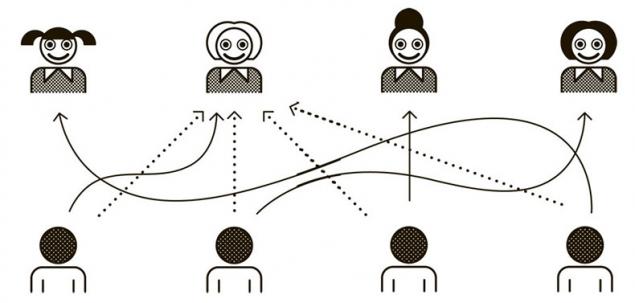
Rules
The company of single young people spend the evening in the bar. They notice at the next table a group of girls a beautiful blonde and a little less cute brunettes and brown hair. How to begin to care for them?
History and usage
"If we all go to blonde, it will disturb each other and it does not get anyone. Then we do girl friends, and they repel us — nobody wants to be second grade. But if nobody will notice, we will not push and do not insult the other girls. So we're going to win. The only way get women. Adam Smith believed that it's better when each group member acts in its own interests. This is true, but not all. In fact, the result will be optimal if each member of the group will do what's best for yourself and for the group" — a quote from the movie "a beautiful mind". The prototype of the hero became a mathematician and Nobel laureate John Nash, famous for the fact that he was able to overcome the symptoms of schizophrenia.
It is not known whether the situation with the real blonde. But the prize named after Nobel John Nash received for the development of game theory. To him mathematics was mainly concerned with games "zero-sum" — when the winning is equal to the loss, the blonde goes to either one or the other. Nash was engaged in those situations when the sum is not zero, that is, someone gets a brunette, others blonde.
The Nobel prize he received for a strategy, which is now called the "Nash equilibrium". The encyclopedia describes it as: "a Situation in which neither party can increase the gain by changing his decision unilaterally, when other participants don't change decisions."
It is clear that when meeting with the ladies at the bar hardly anyone uses math (unless you are a future Nobel prize winner). But these formulas work very well in business — in fact, the award went to Nash in the category "Economy".
Human qualities
Household morals from works of genius math is very simple: better to cooperate than to compete.
8. "Duel for three": the winner is the weakest
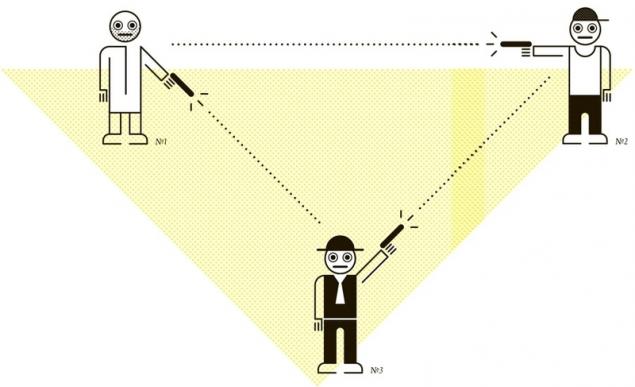
Rules
Three people stand at the vertices of a regular triangle and alternately shoot at each other. Victorious is the one who survived.
History and usage
The first time such a scenario appeared in an article by the American mathematician Kinnard in 1946.
— The second world war ended recently, and Kennard proposed to consider this analogy in the spirit of "fascist Germany attacked the Soviet Union — America comes to the rescue," says Alexei Savvateev.
After there were numerous modifications to the rules: increasing the number of players, change their skills, introduced simultaneous shots or even pacifist volleys into the air.
In all variations there is one trend: the weaker the shooter, the higher the chances of winning. It is more logical to destroy the first the strongest opponent. This paradox can be sometimes observed in the market. Leading corporations battle each other, cause marketing strikes. The result is pulled forward any secondary firm at which just no fighting. A similar pattern can be observed in any competition, be it sports, elections or fight for position.
Human qualities
Here is mathematics in the service of justice. Strong so busy fighting each other that the weak finally get your chance.
9. Auction: to sell $ 20 for 204
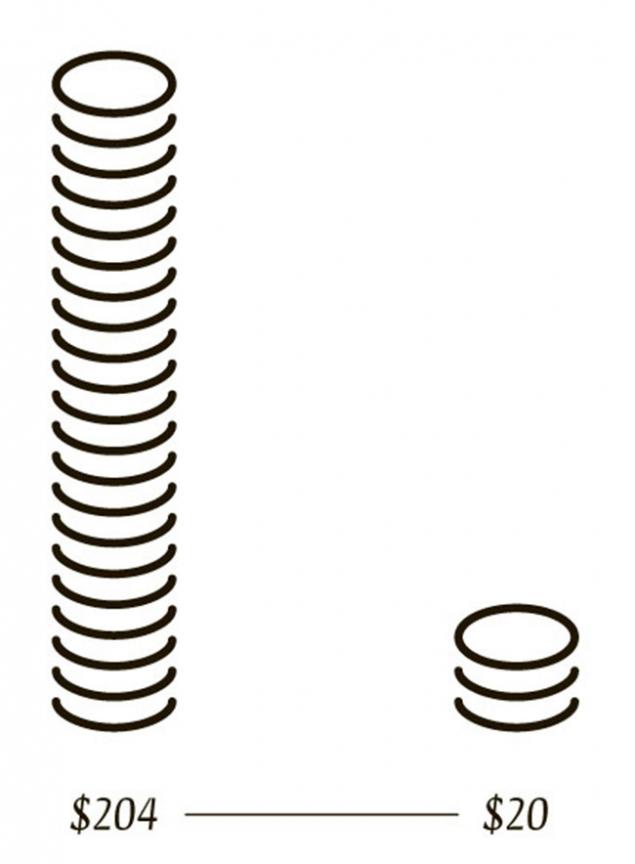
Rules
Tendered bill of twenty dollars. Participants offer their price, starting from $ 1. Bill goes to the one who offers the highest bid. The owner goes to twenty and the amount of the rate that was offered before the final.
History and usage
This game from year to year with their students Max Bazerman, Professor at Harvard business school. He shows the audience a twenty dollar bill and promises to sell it to the person, whose bid will be maximum. Theoretically, some lucky guy could buy twenty for $ 15. Professor in addition to 15 gets and 14 from of the poor guy whose bid was the previous one.
Record Braterman — 204 dollar. At first, the students gladly accept the opportunity to cash in on the eccentric lecturer and vigorously raise interest rates, but with $ 15 most of them are a little out of the game. Noticed that at the same time changing the behavior of players: replaced by rational rates in the spirit of "the situation is under control" come nervous, risky and inappropriate moves. After exceeding the nominal $ 20 in the game usually is only a couple of losers who then desperately try to reduce their costs to a minimum and steadily raise the rate to the fear of being last.
Naturally, the game is not for profit Bazerman (professors at Harvard and so not bad earn). The struggle for twenty reveals the mechanism of the auctions, gambling and other systems where there is a dilemma: to fix the damage or try to win.
Human qualities
Greed, intelligence and stupidity, thrift, reckless, pride, perseverance and shortsightedness.
10. "Marriage": the Nobel prize for the right organization of marriage
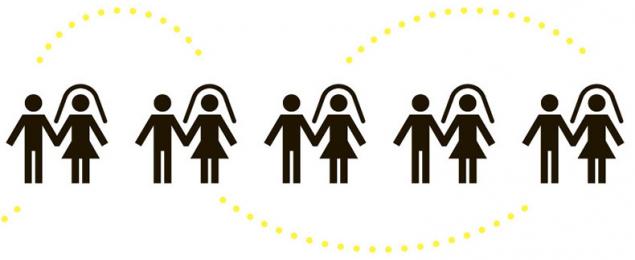
Rules
Given two sets of elements — men and women. For each of them there is a system of priorities in choosing a partner. You want to split these picky people on a perfectly stable couples: neither spouse should not feel the mutual attraction to the foreign partner (unrequited passion no one denies). In various embodiments, the rules change choosing a side (matriarchy/Patriarchy), the number of men and women or allowed polygamy.
History
The article "College admissions and stability of marriage" by David Gale and Lloyd Shapley appeared in the scientific journal American Mathematical Monthly in 1962. And in 2012, Shapley received for this work the Nobel prize in Economics.
To solve the problem they proposed that Patriarchal algorithm. First, each groom comes with a proposal of marriage to the number one on your list. On women meet the most suitable candidates vague "could be", and the rest sent home. After that unsuccessful suitors knocking at the door of his Vice-mistresses, and the girls again handing out the coveted "could be" (if the new bride liked the previous one, they can even break the "engagement" of the first stage). This scenario is repeated until, until all grooms will not be able to achieve the consent of chaste brides, which at the end of the game magically turns into a solid "agree".
Unknown, did someone exactly looking for a wife in reality. But the designed in article algorithm has been successfully used for the allocation of students to colleges, doctors to hospitals, and even donor organs for patients. For this, in fact, was given the award named after Nobel.
Human qualities
It seems that this simple algorithm can always find new details. So, the game ends on the first round if all men like different women. Feminists got angry, because in this case the opinion of the brides do not take into account. In addition, the stability of the breaking still does not mean universal happiness: many men and women dream about foreign husbands, the main thing — that without reciprocity. And again, the algorithm is as if specially created in the spirit of recent decisions of the state Duma, because it implies absolute heterosexuality.
Is split to the problem of marriage works well for students and colleges, of interns to hospitals, and for couples, but not running for the blue! — NES Professor Alexey Savvateev starts keen to draw on paper scheme: — we Have four homosexual A, B, C, and D. each, as usual, your preferences. For example, A like B, then C and then D. This D at all, nobody cares and therefore his preferences to us is not important. And, see, they can't break into a steady couple. Here it is, math and life. The breakdown for couples is not for the elements of two sets, and for items one and everything is unstable. published
Authors: Mikhail Petrov, Julia Ignatenko, Igor Grigoriev, Alexander Sorokin
P. S. And remember, only by changing their consumption — together we change the world! ©
Join us in Facebook , Vkontakte, Odnoklassniki
Source: www.rusrep.ru/article/2013/07/17/igry
1. "Prisoner's dilemma": to knock or not to speak?

Rules
Imagine that You tried to Rob a Bank. But, alas, You and Your accomplice was caught and put into different cells. The investigator proposes a deal: You give evidence against your partner and then get a chance for liberation for the help to a consequence. You have four options.
1. You agree and testify. Your companion is silent. Then he gets ten years and you go free.
2. You inject, and your partner talking. Then you both get two years.
3. You proudly say nothing, but your co-defendant is testifying. Then to freedom he goes out, and you get ten years.
4. You're both silent, and in six months you released for lack of evidence.
And what do you choose? The interrogator opens the door of your camera...
History and usage
The basic model of the "prisoner's Dilemma" proposed in 1950 by the American mathematicians Merrill flood and Melvin Dresher working at RAND research Corporation. This game is needed to predict the nuclear arms race — the role of prisoners were made by the USSR and the USA.
Since then, the game became very popular among mathematicians, philosophers and psychologists. Leaving the military criminal cover, you can also find many other examples. The same arms race is now very similar to the advertising campaign. Constant competition in the amount of advertising content steadily increases the costs of firms. Accordingly, from the termination of the race would benefit all parties. But if someone treacherously violated the truce, he will win the war for the consumer, and the rest will lose.
In the US, even the competitions between teams of universities for the best programmed game strategy in a "prisoner's Dilemma", where victory is awarded for a minimum period of imprisonment on the basis of several rounds of interrogation. Won program based on the principle of "an eye for an eye": she came every your partner exactly as it do a course previously. But it's still math, human life is much more complicated.
Human qualities
In reality, you are unlikely to Rob banks. But Russian investigators will not offer such deals. It is a model, parable, metaphor of human relations.
That the total punishment was the least profitable to both silent. Then the total period of his release will be only a year or a lot less than any other scenario. But how much do you trust someone that was going to work? And he to you? And what do you mean his interests? To what extent are you willing to risk?
The main problem of the "prisoner's Dilemma" is trust. It is because of the reluctance to trust another and there is a conflict of interests, which was erected in the absolute, for example, the writers of the horror series "Saw". Thus, in the fifth part of the heroes can get rid of literally a little blood to escape from the trap. But instead they begin to compete, which leads to the death of most of them.
2. "Ultimatum": how much would You pay for justice?

Rules the Two players are to divide a certain amount of money, say 1000. The first of them, the pitcher, offers its own version of the division, for example, each of 500 rubles, or the 800, and mate — 200, etc. the Second player, the host, can either accept the proposed terms and to obtain their share, or to reject the scheme of the section. In the second case, nobody gets paid — they go back to the Bank.
History and usage
The rules of this game were first formulated in 1982 in the Journal of Economic Behaviour and Organization to describe the process of negotiations. Simple in modeling and paradoxical results, it quickly became a favorite object of study for scientists around the world. The game "Ultimatum" fits many situations. For example, when the question, what part of the profit be spent on staff salaries, and which give the owners of the company.
Human qualities
What would you do in place of the host? Assuming rationality, it is necessary to agree to any version of section of money. Even if a pitcher wants to pick up a 990 rubles, still not worth arguing: 10 rubles still more than zero. But in addition to rationality, there is also justice.
In hundreds of experiments, the feed often offer their teammates from 50 to 30%. Somewhere in the interval from 30 to 20% of cases begin to withdraw from the transaction, choosing the principle of "do not get you to anybody!".
The understanding of justice depends on the culture. Peruvian Indians, for example, were inclined to accept almost any suggestions, and Asians were much sensitivity and are bitchier Americans. In one experiment, conducted in Indonesia, the subjects refused amounts, the components of several of their monthly salaries.
Actually, many psychologists did whatever the theme of the game "Ultimatum." It turned out that the results of the experiment are influenced by many factors: sexual arousal, age, degree of aggressiveness, testosterone level and so on.
In 2003 the journal Science published an article about the study in which the brain of the players in "Ultimatum" continuously monitored using MRI. It turned out that the host, after receiving the proposal aktiviziruyutsya islet, the proportion of the brain, the upper region of the frontal cortex and cingulate gyrus. The first of these areas is considered to be responsible for processing and formation of negative emotional information, and the other two — cognitive processes of self-control and choice. The outcome of this confrontation ancient mechanism of acquired emotions and rational thinking determines the final decision.
The experiments produced unexpected results. Subjects artificially blocked the rational frontal cortex. It would seem that the released emotions have mad to reject unfair offers. But the opposite happened: the players have become a lot more pliable and supple, emotions anger and resentment yielded to the innate sense of greed. It turns out that the most rational activity of the frontal cortex and leads to a deviation from reasonable mathematical strategies and ideas of honor and justice are forcing people to take a balanced-unfavorable decision. No wonder the experiments conducted on groups of autistic children, the percentage of failures was much lower. Devoid of social prejudices, they are much more likely to follow a perfect mathematical model.
The interaction of cognitive and emotional mechanisms of decision making and determines rational behavior of the person and a violation of any of them leads to a suboptimal choice strategies. These two systems can conflict, resulting in many examples of utilitarian thinking led to disastrous consequences and directly contradict the norms of morality, explains Anna Shestakova, senior researcher, Centre for neurocognitive research and education.
3. "The tragedy of the community field": if all will do so

Rules
The villagers speak a common pasture. If everyone will graze on it a cow, it's okay, herb will suffice. If someone wants to start a second, it seems to be also OK: the field is big. But if everyone will graze two cows, the grass on the field is not enough, the pasture is depleted, hunger starts.
History and usage
This model was proposed by William Forster Lloyd in 1833 in the book about the overpopulation.
— This tragedy of the Commons often occurs in life — played out a classic scenario from game theory. Examples of the environmental problems, traffic jams — any place where a person thinks that for free, you can quietly profit at the expense of the company, explains NES Professor Alexey Savvateev.
Behind examples far to walk not necessary. In Moscow, where traffic jams have become a huge problem, but the environmental situation is deteriorating from year to year, the residents stubbornly ignore the social campaign "car free Day", held since 2008. Moreover, according to some, this day the amount of congestion is particularly high.
Article different versions of this game appear in leading scientific magazines such as Science in our time. For example, there is a version of the experiment called "the Public good". Here is how it is described by scientists from the Higher school of Economics Dilyara Valeeva and Maria Yudkevich: "Each participant is initially endowed with a certain amount of money. Everyone should privately decide what proportion of these personal money he can invest in the public good. Invested in the public good money increase several times and divided equally. The group will receive the maximum benefit, if every participant invests his entire initial amount of money. However, players may shy away from investing their money in social enterprises. In equilibrium, predicted by the theory, each participant makes a zero contribution. In real experiments the outcome is usually different: the players bet a certain amount to the public good".
Human qualities
We do not consider it a sin to cause a little damage to nature or society. "From one of the abandoned paper the world won't collapse" — so says a passerby, and the city overgrown with garbage.
Sociologists and psychologists have long been trying to figure out how to get people to be more altruistic. One of the methods involve in the process, giving him a sense of pride in brought the benefit or harm-reduction. For example, at the Summer school of "Russian reporter" the students are encouraged to make a contribution in the amount of from 150 to 600 rubles per day — depending on financial possibilities. If some of the participants will make a minimum contribution, nothing bad will happen. But if everyone does that, then Summer school would be doomed to food shortages, and other problems. It seems that saves us a sense of belonging: "It's my project, I'm for it too answer." At least the last few years the average payment was two times more than the minimum.
The same series of music distribution via the Internet. Some groups offer to download their works for free, and then, after listening, to pay any amount. If you do not pay no one, the band won't record a new album.
Some economists believe that for such schemes the future, at least in the area of distribution of music, books and movies. For example, Professor of Higher school of Economics Alexander Dolgin introduces the concept of "after action reviews of gratitude payments". In his scheme the economy of the future will be able to defeat the riders due to the publicity of the assessment. If I read the book or watched the film, I have to put my personal assessment — to what extent I liked it. And it would be illogical if I put the highest score and not the author will donate a significant amount.
4. "The trolley problem": how can a humanity to kill a person

Rules
On the railroad here it will crash. Trolley filled with passengers, heading for the abyss. You have the opportunity to save her. For this we need your hands to push on the rails a fat road worker who happened to be nearby. People are going to die. But dozens of lives will be saved. Are you ready?
History and usage
The original wording of this painful dilemma was proposed in 1967 by British philosopher Philippa Foot as a thought experiment in ethics. Over the years there were many modifications. You kill one and save three. You kill the baby and save the life of ten. There is even a poignant short film, in which the switchman must choose: to crush his own son designs the bridge or to prevent a train crash with hundreds of passengers.
The most common application of this dilemma, of course, military action. Leaving a platoon to cover the retreat of the regiment, the commander sends on the death of thirty people, but gives a chance to thousands. But this situation can happen on a real railroad. Or during a fire. Or somewhere else.
Not sure we should be talking about life and death. Imagine that you are a Department head that needs to lay off one employee to save the whole team. Or are you taking a lesson in school, and you have to yell at one child to the rest of the class could have.
Human qualities
In this game, very little mathematics: ten is more than one, even a first grader knows. But the psychology of ethics in this dilemma in bulk. The commandment "thou shalt Not kill" is in conflict with the value of preserving life. By the way, in a short film about the switchman, the main character still sacrifices her son and train with unsuspecting passengers calmly went on.
In the experiment, conducted by psychologists at the University of Michigan, subjects were offered a realistic three-dimensional model with trolley, paths and need to kill one to save five. About 90% of the participants translated the arrow and killed a man for the passengers of the trolley. But it's still a computer reality, not real life.
5. "Hawks and doves": to attack or to flee

Rules
In one population of animals coexist two groups with different strategies for resources. First, the "hawks" are always set to a conflict and the meeting with the competitor go all the way. As a result, they either win and assign all resources in the area (+50 points), or lose and get into the fight seriously injured (-100 points). Doves, by contrast, is very peaceful. Seeing the "hawk", they immediately back down (0 points for "dove" and 50 points "hawk"), and when they met with their relatives only represent a willingness to fight. After a long exchange of threats (-10 points both "doves") resources get more lucky "the dove" (+50 points).
There are many other variations of the rules, but the main features of the game remain unchanged: victory brings any bird average points, receiving injuries from the "hawks" is equivalent to a huge fine, and ritual of battle "doves" also require some minimal costs.
The goal is very simple: to earn maximum points, that would be for them, no hiding food, money, females, or "the representation of an individual's genes in the gene pool of a population", as expressed by Richard Dawkins in his book "the Selfish gene".
History and usage
Rules of the game were first published in the journal Nature in 1973. The authors proposed to formalize the conflict animal for resources, territory, or sexual partners. The model allows the ratio of strategies in the population to calculate the number of resources required and received by individuals in a particular embodiment, interactions. The bird metaphor borrowed from the geopolitical slang of the time ("hawks" — for a tough confrontation with the enemy, "doves" — for discharge and compromises).
"Hawks and doves" appeared as the development of the game in which two drivers head toward each other. The loser is the player who first gets scared of a frontal collision and swerve to the side.
Human qualities
We tried to move away from classical game theory in which the set of possible strategies is small and is hard-coded, — says Mikhail Burtsev, head of the laboratory of neurointelligence and neuromorphic systems of the Kurchatov Institute. In 2007 he, along with his Manager Peter Turchin published in Nature an article in which he described how the strategy of "hawks" and "doves" occur naturally in the evolution of computer models.
— We have created a virtual world inhabited by agents who commit primitive acts that could be combined in more complex strategies. The behavior of a single agent was controlled by its own neural network. This allowed us to open up strategies that standard game theory never came to investigate, explains Michael.
So in the process of evolution this computer world it appeared their peace-loving "doves," "hawks", attacking all outsiders, and even "Grange", gathering in flocks in the face of danger. But the most interesting — that these mathematical agents began to appear sublime human feelings: concern about family, sacrifice and altruism.
6. "Pascal's wager": God and the benefit

Rules
Each of us in his relationship with God is free to choose between faith and unbelief. In the first case, it carries negligible costs of complying with rituals and obedience to religious dogmas. But these ultimate losses will be compensated by endless profit and eternal life if God exists. The atheist, by contrast, suffers an infinite loss in the case of the existence of God, but in everyday life sacred is not burdened costs.
History and usage
On the night of 23 on 24 Nov 1654 in a brilliant French mathematician and philosopher, one of the founders of modern mathematical analysis and probability theory Blaise Pascal condescends inspiration. Recovering himself, he hastily writes down thoughts on a piece of parchment, which the rest of your life will wear in the lining of his clothes. Now Pascal is increasingly moving away from science and ignores the previous games — puzzles about the probabilities in gambling and the construction of the machine account. All the rest of his life is never over work "Thoughts on religion and other subjects", the pages of which he offers the reader such a sacred bet.
In one of the modern medical articles draws a parallel between the "Pascal's wager" and the position of the doctor when Tselovalnik the patient. The doctor must make a choice: to inform relatives about the possible imminent death of the patient or to give them hope, saying that maybe it would all cost. To talk about the possibility of recovery psychologically less costly. But if the patient dies, for relatives it would be a blow, and the doctor's reputation will suffer. To admit that the patient is likely to die, more complicated. But if the patient would recover, the doctor threatens the glory of the cynical genius. The authors recommend that physicians adhere to the difficult role of the pessimist. How do I know, maybe that's mindful of the "Pascal's wager", Dr. house did not like talking with relatives of their patients.
Human qualities
"Pascal's wager" emphasizes the paradoxical human desire to explain the irrational belief from the standpoint of reason and mathematical benefits. Dozens of thinkers later pointed to the weakness of this argument. Bet contrary to religious canons. Because faith is "just in case", the formal administration of the rites to the detriment of the inner content can be a greater sin than atheism.
7. The "blonde paradox": as Nobel laureate John Nash taught to care for the girls

Rules
The company of single young people spend the evening in the bar. They notice at the next table a group of girls a beautiful blonde and a little less cute brunettes and brown hair. How to begin to care for them?
History and usage
"If we all go to blonde, it will disturb each other and it does not get anyone. Then we do girl friends, and they repel us — nobody wants to be second grade. But if nobody will notice, we will not push and do not insult the other girls. So we're going to win. The only way get women. Adam Smith believed that it's better when each group member acts in its own interests. This is true, but not all. In fact, the result will be optimal if each member of the group will do what's best for yourself and for the group" — a quote from the movie "a beautiful mind". The prototype of the hero became a mathematician and Nobel laureate John Nash, famous for the fact that he was able to overcome the symptoms of schizophrenia.
It is not known whether the situation with the real blonde. But the prize named after Nobel John Nash received for the development of game theory. To him mathematics was mainly concerned with games "zero-sum" — when the winning is equal to the loss, the blonde goes to either one or the other. Nash was engaged in those situations when the sum is not zero, that is, someone gets a brunette, others blonde.
The Nobel prize he received for a strategy, which is now called the "Nash equilibrium". The encyclopedia describes it as: "a Situation in which neither party can increase the gain by changing his decision unilaterally, when other participants don't change decisions."
It is clear that when meeting with the ladies at the bar hardly anyone uses math (unless you are a future Nobel prize winner). But these formulas work very well in business — in fact, the award went to Nash in the category "Economy".
Human qualities
Household morals from works of genius math is very simple: better to cooperate than to compete.
8. "Duel for three": the winner is the weakest

Rules
Three people stand at the vertices of a regular triangle and alternately shoot at each other. Victorious is the one who survived.
History and usage
The first time such a scenario appeared in an article by the American mathematician Kinnard in 1946.
— The second world war ended recently, and Kennard proposed to consider this analogy in the spirit of "fascist Germany attacked the Soviet Union — America comes to the rescue," says Alexei Savvateev.
After there were numerous modifications to the rules: increasing the number of players, change their skills, introduced simultaneous shots or even pacifist volleys into the air.
In all variations there is one trend: the weaker the shooter, the higher the chances of winning. It is more logical to destroy the first the strongest opponent. This paradox can be sometimes observed in the market. Leading corporations battle each other, cause marketing strikes. The result is pulled forward any secondary firm at which just no fighting. A similar pattern can be observed in any competition, be it sports, elections or fight for position.
Human qualities
Here is mathematics in the service of justice. Strong so busy fighting each other that the weak finally get your chance.
9. Auction: to sell $ 20 for 204

Rules
Tendered bill of twenty dollars. Participants offer their price, starting from $ 1. Bill goes to the one who offers the highest bid. The owner goes to twenty and the amount of the rate that was offered before the final.
History and usage
This game from year to year with their students Max Bazerman, Professor at Harvard business school. He shows the audience a twenty dollar bill and promises to sell it to the person, whose bid will be maximum. Theoretically, some lucky guy could buy twenty for $ 15. Professor in addition to 15 gets and 14 from of the poor guy whose bid was the previous one.
Record Braterman — 204 dollar. At first, the students gladly accept the opportunity to cash in on the eccentric lecturer and vigorously raise interest rates, but with $ 15 most of them are a little out of the game. Noticed that at the same time changing the behavior of players: replaced by rational rates in the spirit of "the situation is under control" come nervous, risky and inappropriate moves. After exceeding the nominal $ 20 in the game usually is only a couple of losers who then desperately try to reduce their costs to a minimum and steadily raise the rate to the fear of being last.
Naturally, the game is not for profit Bazerman (professors at Harvard and so not bad earn). The struggle for twenty reveals the mechanism of the auctions, gambling and other systems where there is a dilemma: to fix the damage or try to win.
Human qualities
Greed, intelligence and stupidity, thrift, reckless, pride, perseverance and shortsightedness.
10. "Marriage": the Nobel prize for the right organization of marriage

Rules
Given two sets of elements — men and women. For each of them there is a system of priorities in choosing a partner. You want to split these picky people on a perfectly stable couples: neither spouse should not feel the mutual attraction to the foreign partner (unrequited passion no one denies). In various embodiments, the rules change choosing a side (matriarchy/Patriarchy), the number of men and women or allowed polygamy.
History
The article "College admissions and stability of marriage" by David Gale and Lloyd Shapley appeared in the scientific journal American Mathematical Monthly in 1962. And in 2012, Shapley received for this work the Nobel prize in Economics.
To solve the problem they proposed that Patriarchal algorithm. First, each groom comes with a proposal of marriage to the number one on your list. On women meet the most suitable candidates vague "could be", and the rest sent home. After that unsuccessful suitors knocking at the door of his Vice-mistresses, and the girls again handing out the coveted "could be" (if the new bride liked the previous one, they can even break the "engagement" of the first stage). This scenario is repeated until, until all grooms will not be able to achieve the consent of chaste brides, which at the end of the game magically turns into a solid "agree".
Unknown, did someone exactly looking for a wife in reality. But the designed in article algorithm has been successfully used for the allocation of students to colleges, doctors to hospitals, and even donor organs for patients. For this, in fact, was given the award named after Nobel.
Human qualities
It seems that this simple algorithm can always find new details. So, the game ends on the first round if all men like different women. Feminists got angry, because in this case the opinion of the brides do not take into account. In addition, the stability of the breaking still does not mean universal happiness: many men and women dream about foreign husbands, the main thing — that without reciprocity. And again, the algorithm is as if specially created in the spirit of recent decisions of the state Duma, because it implies absolute heterosexuality.
Is split to the problem of marriage works well for students and colleges, of interns to hospitals, and for couples, but not running for the blue! — NES Professor Alexey Savvateev starts keen to draw on paper scheme: — we Have four homosexual A, B, C, and D. each, as usual, your preferences. For example, A like B, then C and then D. This D at all, nobody cares and therefore his preferences to us is not important. And, see, they can't break into a steady couple. Here it is, math and life. The breakdown for couples is not for the elements of two sets, and for items one and everything is unstable. published
Authors: Mikhail Petrov, Julia Ignatenko, Igor Grigoriev, Alexander Sorokin
P. S. And remember, only by changing their consumption — together we change the world! ©
Join us in Facebook , Vkontakte, Odnoklassniki
Source: www.rusrep.ru/article/2013/07/17/igry
Tags
See also
"Illegal downloading" Game of Thrones "certainly on hand HBO.
Flight "kal" # 902 has not arrived on schedule
Game of the designer
10 films, which will help to better understand our children
The periodic table is great for playing in the sea battle... It's brilliant!
The ghetto in Germany
Photo Horst
Photographs from National Geographic Contest 2011 (47 photos)


